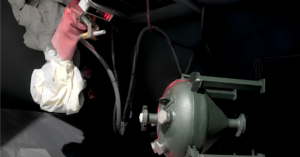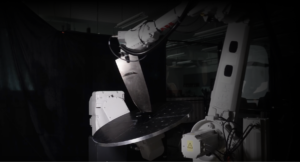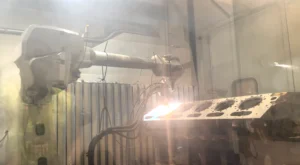table of contents
- Heading 1
- Heading 1
- Heading 1
share this
Since technology is developing so swiftly in the modern world, it could seem as if every industry has adopted automation. However, automated process adoption has been slower in metal fabrication companies. They have concerns and difficulties, so they’re not as eager to accept automation. Moreover, many people are unaware of the degree to which automation might be helpful. This article will explore the reasons behind metal fabrication companies’ reluctance to adopt automation as well as the exciting possibilities it presents for the future.
Challenges Hindering Automation Adoption
- High Initial Costs: The significant upfront investment needed for automation is one of the main barriers for metal fabricating companies. Advanced equipment such as robotics, as well as the software that goes with them, need a large initial investment, which can be problematic for small and medium-sized businesses with limited funds.
- High Mix, Complexity and Customization: The manufacture of metal often involves high-mix, complex and specialized projects that might not be a good fit for standard automated systems built for repetitive tasks. Since metalwork is customized and high-mix, it might be difficult to obtain flexibility and adaptation with off-the-shelf automation solutions.
- Technical Challenges: Putting automation into practice calls for specific technical expertise in both smoothly integrating various systems and controlling the machinery. For smaller businesses, the lack of internal skills to oversee and maintain automated processes is a major barrier.
- Maintenance & Upkeep: In the event of a malfunction, automated systems require immediate repairs in addition to routine maintenance. It can be difficult to find qualified specialists for maintenance and troubleshooting, particularly in areas where there is a shortage of such workers.
- Resistance to Change: Overcoming resistance to change and organizational inertia is a difficult obstacle. Employees may worry about losing their jobs or having to learn new skills, while management may be reluctant to make major investments and alter current procedures.
- Lack of Knowledge or Awareness: Some businesses might not have an in-depth understanding of the advantages that automation may offer. Making informed decisions is made more difficult by a lack of knowledge regarding automation technology advancements.
Embracing Automation: Unlocking Opportunities
Despite the difficulties, things are starting to change as more and more metal fabrication businesses realize how revolutionary automation can be. The following are some strong arguments for why the industry’s evolution depends on accepting automation:
- Increased Productivity and Efficiency: Automation increases production by optimizing performance and streamlining operations to allow for uninterrupted operation. Enhanced productivity results in reduced lead times, better delivery schedules, and increased market competition.
- Improved Accuracy and Quality: Automation produces items with fewer defects, accuracy and consistency. For sectors where precision is essential, like aerospace and automotive, this is very helpful.
- Cost Savings: Automation saves a lot of money over time, even though the initial cost may appear high.
- Enhanced Safety: Automation reduces the hazards involved in dangerous jobs, protecting employees from possible harm. Businesses build safer working conditions and promote a culture of workplace well-being by assigning risky tasks to machines.
- Ability to Focus on Value-Adding Tasks: Automating routine and repetitive tasks frees up human workers to work on more strategic and creative projects that make better use of their knowledge and abilities. This labor redistribution promotes innovation and drives company growth.
- Flexibility and Scalability: Automated systems have unmatched flexibility and scalability, enabling businesses to modify production levels in response to fluctuating demands. Additionally, reprogrammable automation promotes flexibility, making it possible to react quickly to changes in the market and customer demands, especially in the high-mix manufacturing market.
- Addressing Skill Shortages: By closing the gap between supply and demand, automation can reduce the effects of skill shortages. Businesses can reduce problems with staff and guarantee consistent production by automating jobs that normally need specialized skills.
Augmentus: Pioneering Automation Solutions
When it comes to automation, Augmentus is leading the way with its innovative solutions designed specifically for metal fabrication. Our solution is super easy to use through which companies can automate tasks without needing fancy programming skills. By using Augmentus, businesses can:
- Accelerate deployment of automation solutions
- Enhance operational efficiency and productivity
- Reduce costs and optimize resource utilization
- Improve workplace safety and employee satisfaction
- Stay agile and responsive to evolving market dynamics
Conclusion
Even though in the past metal fabrication companies would have been reluctant to adopt automation, it is evident that times are changing. The industry is ready for a revolutionary journey towards increased productivity, efficiency, and competitiveness in the global market landscape due to a better grasp of the potential and difficulties connected with automation. It’s time for metal fabrication companies to embrace automation and take advantage of this new revolution.
Header Image Source




